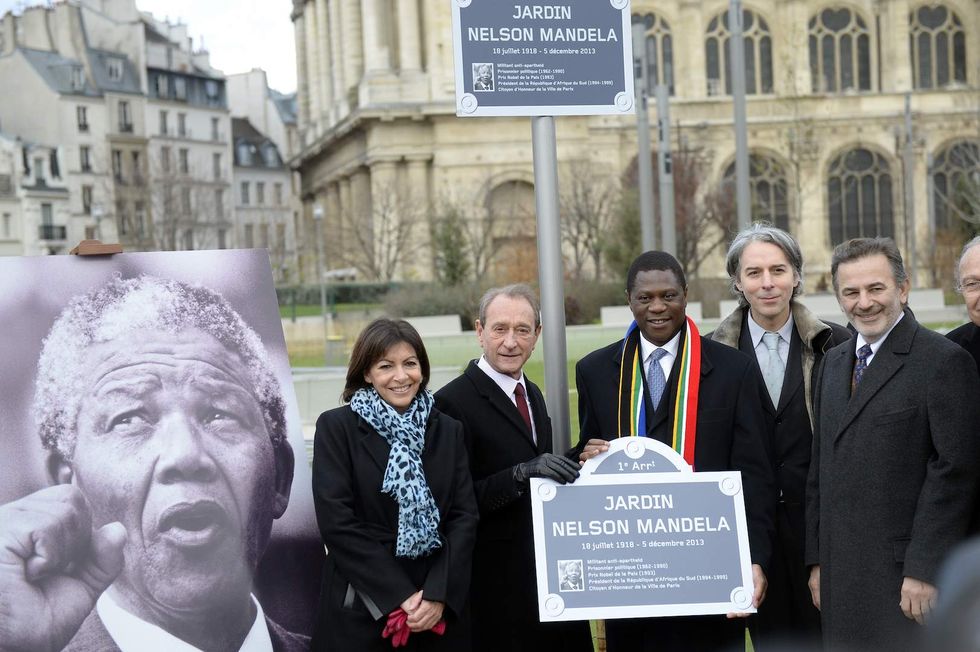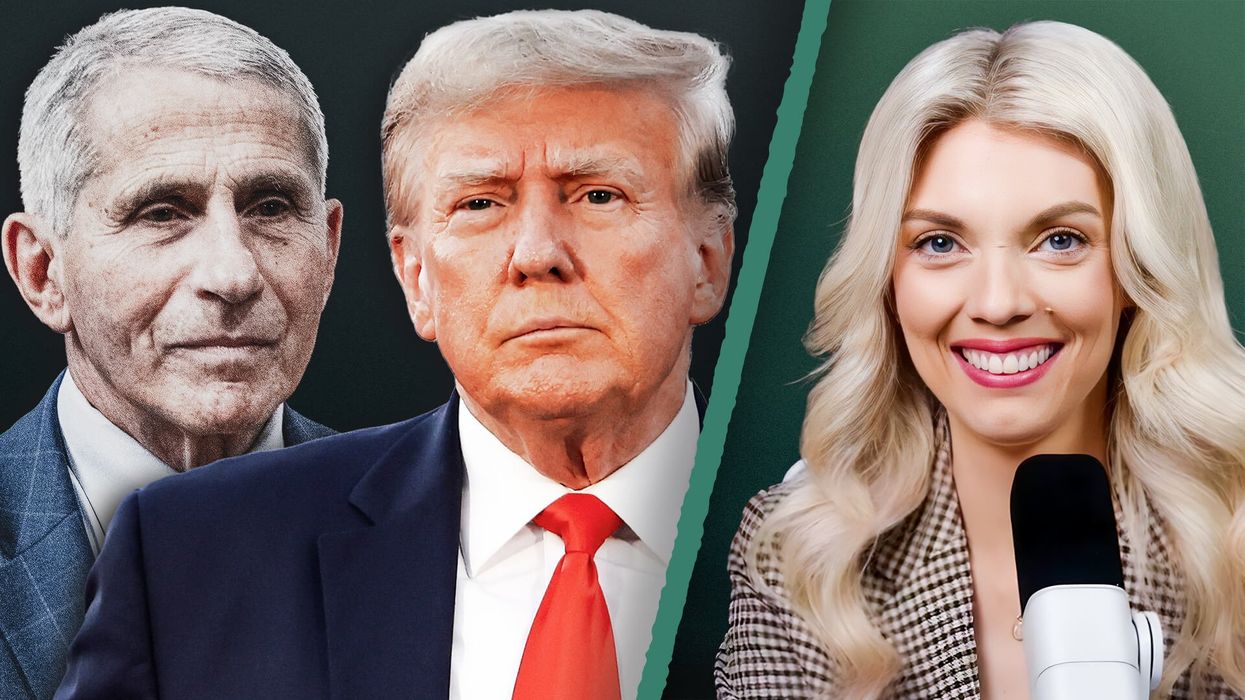Former British Prime Minister Margaret Thatcher once said, "The problem with socialism is that you eventually run out of other people's money." Today, the country Nelson Mandela once led is finding that out firsthand.
Ernst Roets is a native of South Africa and producer of the film, "Tainted Heroes," which takes a look at the deceitful political tactics of the country's ruling party, the African National Congress
The ANC's rise to power came just five years after the fall of the Berlin Wall in 1989, when much of the world held a negative view of communism and its effects. As a result of public sentiment at the time, Roets said the South African Communist Party, formed in 1921 by mostly white working class people, started co-operating with the ANC in 1927.
The SACP was formed by members of the International Socialist League, along with other socialist organizations from around the world.
The ANC rejected the idea of communism in the 1930s, but in the 1950s, the ANC and SACP's relationship strengthened. By partnering with the left-leaning ANC, Roets said, the SACP tried to mask its communist agenda. The two groups together fought for a "liberal social democracy," which was eventually achieved in 1994. The ANC has remained in power in South Africa since the mid-90s.
The ANC's goal is to have a National Democratic Society, through the ongoing National Democratic Revolution.
Roets said that former South African President Nelson Mandela, who died in December 2013, was largely "out of sync" with the African National Congress, which he led during the 1990s. According to Roets, Mandela was focused more on uniting people of all races in South Africa than other members of the ANC.
But, Roets said, the world's interpretation of Mandela isn't exactly correct, either.
Following Mandela's election in 1994, protesters with the opposing Inkatha Freedom Party marched to the ANC headquarters in Johannesburg. It was there that ANC security guards opened fire on the protesters, killing 19 people. The incident came to be known as the Shell House Massacre.
Mandela was succeeded as South African president in 1999 by Thabo Mbeki, who resigned in 2008. Mbeki was replaced by Kgalema Motlanthe, who served as South Africa's president for one year. In 2009, Jacob Zuma was elected South Africa's president and has remained in power since.
During an interview with TheBlaze last week in Washington, D.C., Roets explained what the National Democratic Revolution is and its effects to date.
[graphiq id="3OdgRFRQgkZ" title="South Africa" width="500" height="810" url="https://w.graphiq.com/w/3OdgRFRQgkZ" ]
"[T]he ANC ... and its alliance partner, the South African Communist Party, must still hold their socialist policies and communist ideals but not put it to the forefront," Roets said. "So they must rather present themselves or position themselves to being committed to the ideals of liberalism or liberal democracy. They then used this to garner international support, and the idea was once they get this support they could start using the government apparatus to lead the country down the path to communism."
Currently in South Africa, more than 45 percent of the country's households receive what are referred to as "social grants" from the government, which are paid out on a monthly basis. Roets described these as essentially the equivalent of welfare checks in the U.S. But it's not just welfare checks the government is handing out like candy — a number of other government programs, intended for the masses but funded, in large part, by the few, are driving the country to the brink of bankruptcy.
On Saturday, the government faces the daunting challenge of somehow finding the money to pay out its promised grants — the money that nearly half of its citizens now rely upon for their livelihoods. If the government isn't able to meet its obligations, Roets told TheBlaze, "you can expect there would be riots."
"All indications at this stage are that they're not going to be able to pay out these grants," Roets said, referring to the Saturday deadline, when South Africans who are dependent on the government for their income might be in a for a rude awakening.
Because of the level of government spending compared to current tax revenue and economic activity, Roets said the socialist government is hard-pressed to find the money to pay its citizens. And he believes the result of such a failure could be catastrophic.
"It will be a big disaster for the country," he said, "because half of the households in our country — almost half of the households — will suddenly not get money from government anymore."
In South Africa, which has a total population of around 55 million, there are 14 million people who are registered to pay income tax. Roets cited one analysis by the Solidarity Research Institute, which found that 1.7 million people, the equivalent to about 3 percent of the country's total population, pay about 80 percent of the nation's income taxes. He described this system as one that is "rigged to fail."
"I think what led to this problem is that our government in South Africa has been dealing with social grants as a sign of a good government," Roets explained to TheBlaze. "The [idea that the] more government gives people free stuff, the better the government is or the better the so-called quality of government. They would even go as far as boasting about them."
During election seasons, for example, Roets said the ruling party is known to display billboards along highways citing the number of people reliant on the government's social grants when they took office contrasted with the number of people reliant on government grants around the time of that election. The greater the number of people who rely on the government, in their view, the better the "quality" of the government.
"So they would use this to keep people voting for them. Because once you're paid by the government every month, it really creates a massive incentive to keep voting for them or to keep them in power. So it's a political strategy," Roets explained.
The problem with that "strategy," Roets said, is that it doesn't incentivize anyone to work more. In fact, if anything, it convinces them to work less. "You can sit at home and get money from government, but once you get a job, you stop getting money from government," Roets said.
If riots come after the Saturday deadline, it won't be the first time. After all, it was riots that led to the South African government making education free for its citizens, Roets said. When people started demanding "free" education," officials at first said there wasn't enough money to make that happen. Then riots occurred, and all of a sudden, the government promised education for all.
Officials, though, are still trying to figure out how to make that promise a reality. So far, the actions taken by leaders have been far from impressive.
According to Roets, South Africa's "education for all" push has proven to be a nightmare for many students. For example, he said, those seeking to become doctors must become registered with the health proficiency council, which is funded by the Department of Health. Soon-to-be physicians must complete a certain number of hours working for the government agency before they are able to practice medicine on their own. The problem, though, is that the Department of Health is running low on cash, so it can afford to employ only small number of students seeking to become doctors. The result is a growing number of students with medical degrees, but no jobs.
As for the state of health care in South Africa, Roets recalled a recent trip he made with his father to the emergency room.
Roets said that his father waited 30 minutes as he was "literally lying there screaming." But all that one hospital employee could do was look at Roets' father and tell him "no one's able to help you at the moment."
Roets said that when his father finally did receive treatment, it was anything but sanitary.
"I remember that literally the sheets [my father] was lying on in his bed were covered in the blood of the previous patient. And there were literally blood stains on the windows. You could see they had been there for a few weeks and hadn't been washed off," Roets vividly described.
With just days to go until the Saturday deadline for the government to pay its citizens, Roets said he fears that the government would only use any riots that break out as a "scapegoat" to force those who do pay taxes to pay more.
"They could say, 'Those people have all the money that we need to give to you,'" Roets explained. "So I am concerned if a riot like this starts, it will be against government, but then it will be redirected by government toward the taxpayers."
The question now is, given the likes of what has happened in countries like Greece, where the government was recently forced to enact certain austerity measures, do people in South Africa realize that a change is needed?
Roets said "everybody" thinks change is needed. The more specific question, though, is what type of change they believe needs to happen. Roets said he fears the "change" that more people in South Africa might begin pushing for will only make matters worse.
"The majority of people," Roets said, "would say things need to change, so we need to go and take the stuff of the rich people because if you're rich and you've earned something it's because you have exploited poor people or it's because of the evils of capitalism."



